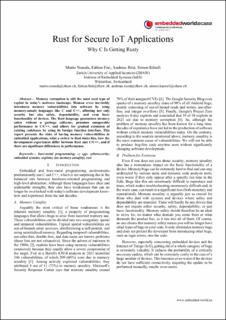Please use this identifier to cite or link to this item:
https://doi.org/10.21256/zhaw-25046| Publication type: | Conference paper |
| Type of review: | Peer review (abstract) |
| Title: | Rust for secure IoT applications : why C is getting rusty |
| Authors: | Noseda, Mario Frei, Fabian Rüst, Andreas Künzli, Simon |
| et. al: | No |
| DOI: | 10.21256/zhaw-25046 |
| Conference details: | Embedded World Conference, Nuremberg, Germany, 21-23 June 2022 |
| Issue Date: | Jun-2022 |
| Publisher / Ed. Institution: | WEKA |
| Language: | English |
| Subjects: | Bare-metal programming; C; CPP; Cybersecurity; Embedded system; Exploit; IoT; Memory unsafety; Rust |
| Subject (DDC): | 005: Computer programming, programs and data |
| Abstract: | Memory corruption is still the most used type of exploit in today’s malware landscape. Human error inevitably introduces memory vulnerabilities into software by using memory-unsafe languages like C and C++, affecting not only security but also safety, dependability, and even basic functionality of devices. The Rust language guarantees memory safety without a garbage collector, promises comparable performance to C/C++, and allows for gradual extension of existing codebases by using its foreign function interface. This report presents the risks of having memory vulnerabilities in embedded applications, what a switch to Rust looks like, how the development experiences differ between Rust and C/C++, and if there are significant differences in performance. |
| URI: | https://digitalcollection.zhaw.ch/handle/11475/25046 |
| Fulltext version: | Published version |
| License (according to publishing contract): | Licence according to publishing contract |
| Departement: | School of Engineering |
| Organisational Unit: | Institute of Embedded Systems (InES) |
| Appears in collections: | Publikationen School of Engineering |
Files in This Item:
| File | Description | Size | Format | |
|---|---|---|---|---|
| 2022_Noseda-etal_Rust-for-secure-IoT-applications.pdf | 454.63 kB | Adobe PDF |  View/Open |
Show full item record
Noseda, M., Frei, F., Rüst, A., & Künzli, S. (2022, June). Rust for secure IoT applications : why C is getting rusty. Embedded World Conference, Nuremberg, Germany, 21-23 June 2022. https://doi.org/10.21256/zhaw-25046
Noseda, M. et al. (2022) ‘Rust for secure IoT applications : why C is getting rusty’, in Embedded World Conference, Nuremberg, Germany, 21-23 June 2022. WEKA. Available at: https://doi.org/10.21256/zhaw-25046.
M. Noseda, F. Frei, A. Rüst, and S. Künzli, “Rust for secure IoT applications : why C is getting rusty,” in Embedded World Conference, Nuremberg, Germany, 21-23 June 2022, Jun. 2022. doi: 10.21256/zhaw-25046.
NOSEDA, Mario, Fabian FREI, Andreas RÜST und Simon KÜNZLI, 2022. Rust for secure IoT applications : why C is getting rusty. In: Embedded World Conference, Nuremberg, Germany, 21-23 June 2022. Conference paper. WEKA. Juni 2022
Noseda, Mario, Fabian Frei, Andreas Rüst, and Simon Künzli. 2022. “Rust for Secure IoT Applications : Why C Is Getting Rusty.” Conference paper. In Embedded World Conference, Nuremberg, Germany, 21-23 June 2022. WEKA. https://doi.org/10.21256/zhaw-25046.
Noseda, Mario, et al. “Rust for Secure IoT Applications : Why C Is Getting Rusty.” Embedded World Conference, Nuremberg, Germany, 21-23 June 2022, WEKA, 2022, https://doi.org/10.21256/zhaw-25046.
Items in DSpace are protected by copyright, with all rights reserved, unless otherwise indicated.